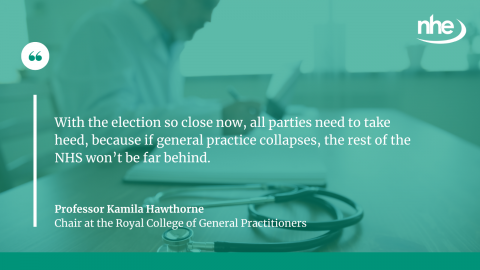New figures from NHS England (NHSE) show the admirable level of performance being achieved in general practice, but also have health leaders concerned that they evidence the unrelenting and unsustainable pressure on GPs.
NHSE’s May statistics indicate that GP teams delivered around 30.5 million appointments in the month, which is approximately 5.2 million more than the same month in 2019.
Chair at the Royal College of General Practitioners (RCGP), Professor Kamila Hawthorne, said: “These latest figures are further evidence of the unsustainable pressure on general practice, with buckling GP practices delivering more and more appointments, yet with fewer doctors.”
Prof Hawthorne highlights that the aforementioned appointments were delivered with 480 fewer fully qualified, full-time equivalent GPs than in the December of 2019.
“This means that each GP is, on average, responsible for 149 more patients than there were five years ago,” she said.
Much has already been said about the two main political party manifestos — especially on their distinct lack of detail — however, the Conservatives have pledged to build or modernise 250 GP surgeries, and recruit 28,000 more doctors.

Meanwhile, Labour have outlined their intention to shift resources further upstream, with widened GP access earmarked as the core tenet for the revamp.
“We’re encouraged by some commitments from political parties to redirect funding towards primary care — but general practice has faced decades of underfunding and poor workforce planning, and we and our patients need immediate action,” said Prof Hawthorne.
Instead, the RCGP urges the country’s political heavyweights to seek inspiration from its own manifesto, which sets out seven steps to safeguard the future of general practice.
The steps include to:
- protect patient safety through a national alert system that flags unsafe levels of workload and acts accordingly;
- increase the share of NHS funding to general practice;
- provide more support to those within deprived communities by reviewing funding streams;
- take clear action to grow the GP workforce (12,000 more needed by 2031/32, per NHSE estimates);
- give patients modern buildings through at least £2bn of infrastructure investment;
- allow GPs to spend more time with patients by reducing top-down contractual requirements; and
- guarantee permanent residence for international medical graduates qualifying as GPs.
Compared to 2018/19, GPs have delivered 65.8 million more appointments this year (excluding Covid-19 vaccinations).
This comes as almost all (98%) GP practices in England have now upgraded their telephony equipment, so lines can be expanded.
“Millions more appointments are being delivered every month compared to before the pandemic thanks to GP teams,” said NHSE’s national primary care director, Dr Amanda Doyle.
“Every GP practice is upgrading their telephone systems to make it easier for patients to contact their surgery, while patients can use the NHS app to order repeat prescriptions and view their test results without needing to contact their family doctor.”
Image credit: iStock



















